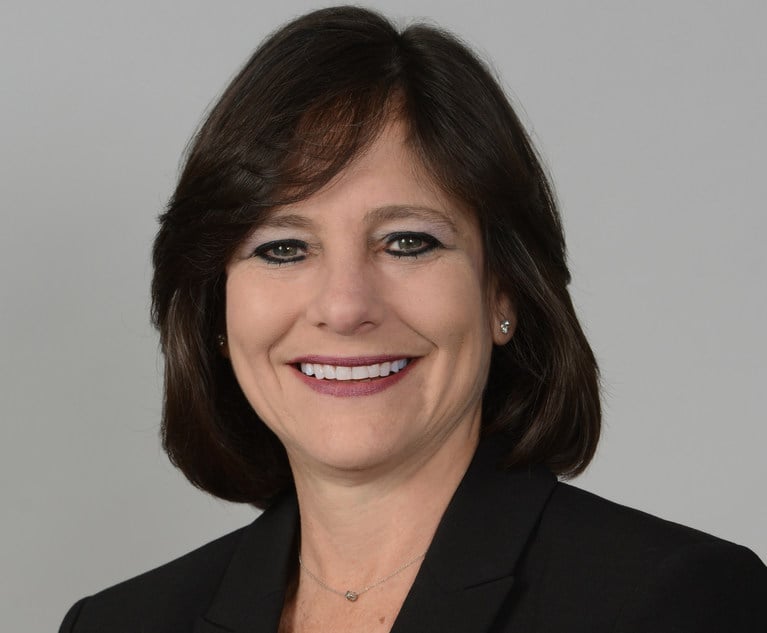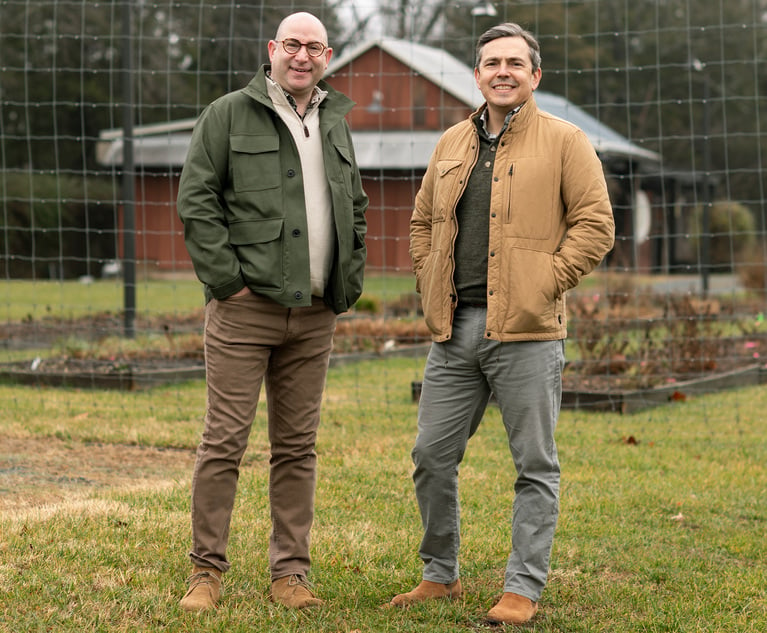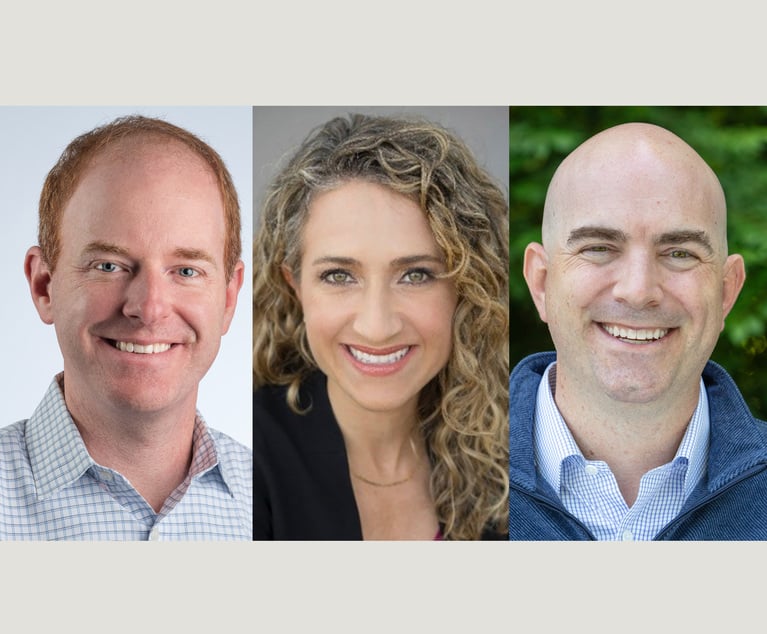 Jake Evans of Holland & Knight, Atlanta. (Courtesy photo)
Jake Evans of Holland & Knight, Atlanta. (Courtesy photo)Black Swan—COVID-19 and Its Impact on the Practice of Law
As lawyers, we must accept that COVID-19 will change the practice of law; it will change how legal services are provided; it will change how legal services are marketed; and it will change how legal services are taught.
April 13, 2020 at 08:00 AM
5 minute read
The original version of this story was published on Daily Report
Nassim Nicholas Taleb's book, "The Black Swan," terms certain seismic events as "black swans." The book's title alludes to an ancient Latin expression (rara avis in terris nigroque simillima cygno) that presumed black swans did not exist because they had never been seen. Black swans did, in fact, exist, showing that reducing conclusions to past human observations can be faulty. Taleb defines black swans as rare events that have drastic economic consequences and can only be predicted in retrospect.
Taleb argues that black swans expose fundamental structural weaknesses and typically create pervasive future changes to address those weaknesses. Debate exists over whether the COVID-19 outbreak qualifies as a black swan. But one thing is certain: COVID-19 will alter the societal fiber of America and, more specifically, the practice of law in the short term and possibly the long term. While black swan events wreak havoc, they also create realignments and new opportunities, alter norms and can improve efficiencies.
As lawyers, we must accept that COVID-19 will change the practice of law; it will change how legal services are provided; it will change how legal services are marketed; and it will change how legal services are taught. Some of these changes will be short term, and others long term. Being able to adapt to complement these evolutions minimizes their impact and accelerates our ability to overcome them. This article discusses expected changes.
The Digitization of the Practice of Law
The most immediate change has been that legal services are being provided remotely. More lawyers than ever are working from home. Law firms are either using existing remote working infrastructure or are expeditiously building out the needed infrastructure.
What is unprecedented, though, is the virtual administration of some legal services. For the first time in Georgia history, the Supreme Court of Georgia is hearing oral arguments virtually. Mediations, arbitrations and depositions are also being done virtually. Law schools, which have been resistant to online training, have implemented online classes, and CLEs are being administered only via virtual means. Corporate board meetings, television interviews and even public declarations are being done remotely, often in the homes of public officials.
By necessity, lawyers have altered acceptable practices to lessen the limitations imposed by COVID-19. Whether these newfound norms take root is unknown. Could lawyers that never worked from home find it suitable? Could law firms, particularly smaller firms, find remote working more economically efficient? Could courts discover that virtual hearings are less costly, more accessible and safer? Could Atlantans conclude the only solution to traffic is working from home? Only time will tell. The legal profession is being forced to dip its toe into a new digitized ocean.
Adversity often forces positive change that otherwise would not happen. Perhaps COVID-19 will propel the legal profession into the digital age—a change that was arguably long overdue.
Business Development in a Social Distancing World
Although much is still unknown, it is unlikely America returns to pre-COVID-19 normalcy for many months. Marketing lunches, drinks, sporting events and networking events are gone. Even the handshake, some epidemiologists argue, could be a gesture of the past.
Legal marketing in the current environment requires an emphasis on the digital social media space and virtual meetings. Late-adopters of digital marketing may be forced to fully embrace it, and the importance of nurturing and harvesting existing relationships is paramount. Minimizing the impact of COVID-19 on business development requires adaption and foresight. The lawyers that are able to exercise both will best manage, and even grow, their practice in a rapidly evolving world.
Focus on Client Needs
COVID-19 moved certain legal issues to the forefront of client needs. Stay-at-home orders, forbearance agreements, relief provided by the CARES Act and force majeure clauses are issues clients are presently facing. Lawyers are trained professional learners. Become an expert in these areas to provide utmost value to your clients.
Even more, anticipate on-demand legal areas in a post COVID-19 world. As a few examples, the regulations implicated by the increasing use of telemedicine, litigation arising from city, county and state stay-at-home orders and the stark rise in insurance claims and ensuing coverage disputes. New industries also will be created to fill gaps exposed by COVID-19. Anticipate these industries and market to them.
Be Nice
One final characteristic of black swan events is they are global in impact. To date, COVID-19 has infected persons in over 150 countries across the globe. It is hard to envision a more global shock of adversity.
Lawyers are held to the highest standards of professionalism. If there was ever a time to exceed these standards, it is now. Everyone around us is facing some of the most difficult times in their life. Be nice.
Conclusion: Adaption is Key
The one constant in life is change. One of my childhood icons, Bruce Lee, once said, "[y]ou must be shapeless, formless, like water." Lawyers must embrace the current quickly evolving circumstances, mold to them and be assured that the resolve of the human spirit will prevail.
Jake Evans is an attorney at Holland & Knight in Atlanta. His practices include public policy and regulation, government representation and litigation and dispute resolution.
This content has been archived. It is available through our partners, LexisNexis® and Bloomberg Law.
To view this content, please continue to their sites.
Not a Lexis Subscriber?
Subscribe Now
Not a Bloomberg Law Subscriber?
Subscribe Now
NOT FOR REPRINT
© 2025 ALM Global, LLC, All Rights Reserved. Request academic re-use from www.copyright.com. All other uses, submit a request to [email protected]. For more information visit Asset & Logo Licensing.
You Might Like
View All
Litigation Leaders: Greenspoon Marder’s Beth-Ann Krimsky on What Makes Her Team ‘Prepared, Compassionate and Wicked Smart’

Why the Founders of IP Boutique Fisch Sigler Are Stepping Away From the Law and Starting an AI Venture
Law Firms Mentioned
Trending Stories
- 1'Pull Back the Curtain': Ex-NFL Players Seek Discovery in Lawsuit Over League's Disability Plan
- 2Tensions Run High at Final Hearing Before Manhattan Congestion Pricing Takes Effect
- 3Improper Removal to Fed. Court Leads to $100K Bill for Blue Cross Blue Shield
- 4Michael Halpern, Beloved Key West Attorney, Dies at 72
- 5Burr & Forman, Smith Gambrell & Russell Promote More to Partner This Year
Who Got The Work
Michael G. Bongiorno, Andrew Scott Dulberg and Elizabeth E. Driscoll from Wilmer Cutler Pickering Hale and Dorr have stepped in to represent Symbotic Inc., an A.I.-enabled technology platform that focuses on increasing supply chain efficiency, and other defendants in a pending shareholder derivative lawsuit. The case, filed Oct. 2 in Massachusetts District Court by the Brown Law Firm on behalf of Stephen Austen, accuses certain officers and directors of misleading investors in regard to Symbotic's potential for margin growth by failing to disclose that the company was not equipped to timely deploy its systems or manage expenses through project delays. The case, assigned to U.S. District Judge Nathaniel M. Gorton, is 1:24-cv-12522, Austen v. Cohen et al.
Who Got The Work
Edmund Polubinski and Marie Killmond of Davis Polk & Wardwell have entered appearances for data platform software development company MongoDB and other defendants in a pending shareholder derivative lawsuit. The action, filed Oct. 7 in New York Southern District Court by the Brown Law Firm, accuses the company's directors and/or officers of falsely expressing confidence in the company’s restructuring of its sales incentive plan and downplaying the severity of decreases in its upfront commitments. The case is 1:24-cv-07594, Roy v. Ittycheria et al.
Who Got The Work
Amy O. Bruchs and Kurt F. Ellison of Michael Best & Friedrich have entered appearances for Epic Systems Corp. in a pending employment discrimination lawsuit. The suit was filed Sept. 7 in Wisconsin Western District Court by Levine Eisberner LLC and Siri & Glimstad on behalf of a project manager who claims that he was wrongfully terminated after applying for a religious exemption to the defendant's COVID-19 vaccine mandate. The case, assigned to U.S. Magistrate Judge Anita Marie Boor, is 3:24-cv-00630, Secker, Nathan v. Epic Systems Corporation.
Who Got The Work
David X. Sullivan, Thomas J. Finn and Gregory A. Hall from McCarter & English have entered appearances for Sunrun Installation Services in a pending civil rights lawsuit. The complaint was filed Sept. 4 in Connecticut District Court by attorney Robert M. Berke on behalf of former employee George Edward Steins, who was arrested and charged with employing an unregistered home improvement salesperson. The complaint alleges that had Sunrun informed the Connecticut Department of Consumer Protection that the plaintiff's employment had ended in 2017 and that he no longer held Sunrun's home improvement contractor license, he would not have been hit with charges, which were dismissed in May 2024. The case, assigned to U.S. District Judge Jeffrey A. Meyer, is 3:24-cv-01423, Steins v. Sunrun, Inc. et al.
Who Got The Work
Greenberg Traurig shareholder Joshua L. Raskin has entered an appearance for boohoo.com UK Ltd. in a pending patent infringement lawsuit. The suit, filed Sept. 3 in Texas Eastern District Court by Rozier Hardt McDonough on behalf of Alto Dynamics, asserts five patents related to an online shopping platform. The case, assigned to U.S. District Judge Rodney Gilstrap, is 2:24-cv-00719, Alto Dynamics, LLC v. boohoo.com UK Limited.
Featured Firms
Law Offices of Gary Martin Hays & Associates, P.C.
(470) 294-1674
Law Offices of Mark E. Salomone
(857) 444-6468
Smith & Hassler
(713) 739-1250








